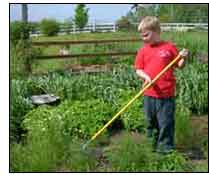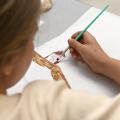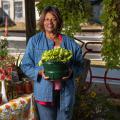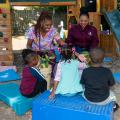Youth Gardening
A garden can be a wonderful place for children. Gardens provide opportunities for playing, learning, and having fun.
 As our society becomes more urbanized and less connected with nature, gardens provide chances for children to learn about nature, how to grow food, and the importance of the natural world. Gardening with children can take place at home, at school, and/or at after-school programs.
As our society becomes more urbanized and less connected with nature, gardens provide chances for children to learn about nature, how to grow food, and the importance of the natural world. Gardening with children can take place at home, at school, and/or at after-school programs.
Some Basic Tips for Gardeners Working with Kids:
- A picture is worth a thousand words. Never tell kids something you could show them.
- Young kids have a very short attention span. Make sure that you have lots of options available so they can get started immediately and stay busy. Digging holes is one thing that seems to hold endless fascination.
- Instant gratification helps a lot. Plant radishes even if you don't like them-they come up in three or four days.
- Growing their own will generally get kids to try eating things they otherwise wouldn't walk into the same room with.
- GETTING DIRTY IS AN INTEGRAL PART OF GROWING UP.
- Your role should be as facilitator rather than as a leader who imposes direction. Be a good model.
- When giving out supplies to several kids, try to keep seeds, tools, etc. as similar as possible to avoid the inevitable squabbles.
- After an activity, do something to reinforce what everyone has learned. Talk about what went on, who did what, who saw what. If you can, have them write things down or draw pictures. If they're too young, take dictation.
- Many kids who won't talk in a large group will often speak easily in a small group.
- When working with older kids (past about 13), one-to-one works better than groups, since gardening (and anything else that could get you dirty) is a remarkably un-cool and disgusting way to spend time. Try to add responsibility and ownership to projects. ("Quincy is in charge of the wheelbarrow today.") Try pairing up older kids with younger ones. Rest assured that if you give them a healthy respect for gardens and green things when they are young, it will stay with them throughout their lives.
- Children are very sensitive to lead poisoning and should take precautions when working in the garden.
Information originally provided by the American Community Gardening Association.
Other Youth Gardening Information
School Gardening Information
Publications
News
Young people had the unique opportunity to learn interesting things about the soil, plants that grow in it and animals that feed on top of it at a recent field day.
Do you enjoy having cut flowers around the house? With the right preparation and some gardening labor, you can harvest your own blossoms just outside the back door.
Success Stories
Susie Harmon laughs when she relates her granddaughter’s observation of her favorite pastime.
The Mississippi State University Extension Service recently relaunched its Nurturing Homes Initiative. The program’s mission is to improve the quality of the early educational experiences provided in family childcare homes through mentoring, improving the learning environment, and delivering research-based information.
The Pearl River County 4-H Junior Master Gardeners have made some special additions to Poplarville City Park. A new pollinator garden planted in raised beds features a wildflower area, a native plant area, and an herb area.






